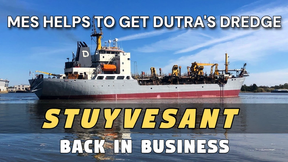U.S. Customs Commissioner Robert C. Bonner announced the deployment of the first team of U.S. Customs officers reporting for duty at the Port of Rotterdam, Netherlands, as part of the Container Security Initiative (CSI).
This is the first time in the 213-year history of the U.S. Customs Service that inspectors will be assigned outside of North America to target and screen cargo before being shipped to the United States. The Netherlands was first in Europe to sign an agreement with U.S. Customs to participate in CSI.
Commissioner Bonner’s policy address at the Center for Strategic and International Studies (CSIS) focused on trade, borders, and homeland security one year after 9/11. Bonner reported on the progress U.S. Customs has made in negotiating agreements with major trading partners under CSI, which was launched in January 2002.
"These partnerships not only make our nations safer, but make the entire global trading system safer as well," Commissioner Bonner said.
Under the terms of the CSI, U.S. Customs inspectors will be assigned to the Port of Rotterdam where they will use U.S. Customs automated systems to identify potentially high-risk containers bound for the United States, containers that pose a terrorist threat. Once identified, Dutch Customs officials will take the lead in screening these containers to ensure that terrorists or weapons of terror are not contained within them.
CSI is a plan to secure an indispensable, but vulnerable link in the chain of global trade: containerized shipping. The initiative supports the "Cooperative G8 Action on Transport Security," adopted by the 8 most important industrialized nations (G8) at their Kananaskis, Canada, meeting on June 26, 2002.
Some 200 million sea cargo containers move annually to and through ports around the world, and nearly 50 percent of the value of all U.S. imports arrives via sea cargo containers every year.
Since approximately 68 percent of the 5.7 million sea containers entering the U.S. annually arrive from 20 foreign seaports, U.S. Customs is initially focusing on these "mega" ports as chokepoints in the global trading system.
In addition to the European ports, U.S. Customs and the Canada Customs and Revenue Agency exchanged inspectors at select seaports in March to target and pre-screen containers bound for each nation. In addition to Canada, with whom Customs pioneered the CSI concept, the Netherlands, France, Belgium, and German have signed agreements with U.S. Customs to implement CSI at the Ports of Rotterdam, Le Havre, Antwerp, Bremerhaven, and Hamburg. Singapore has also indicated that it will participate in CSI. These are 6 of the top 20 ports that ship to the United States.
CSI will be fully operational in Rotterdam by September 2. Commissioner Bonner said that he expects CSI to be fully operational in Le Havre, Antwerp, Bremerhaven and Hamburg in the next few months.
The U.S. Customs Service is currently in discussions with several other nations, including countries in Europe and Asia, about forming additional partnerships under CSI. "CSI’s momentum grows stronger everyday," Commissioner Bonner said. "I expect that we will be signing agreements with several other governments with many more of the world’s major ports in the next few weeks."
Commissioner Bonner outlined the four core elements of CSI: establish security criteria to identify high-risk containers, prescreen those containers identified as high-risk before they arrive at U.S. ports, use technology to quickly prescreen high-risk containers, develop and use smarter, more secure containers.
Commissioner Bonner also provided a progress report on American business taking greater responsibility for security under the Customs-Trade Partnership against Terrorism (C-TPAT). In the four months since Customs launched C-TPAT, over 300 companies have singed up to participate in C-TPAT.
"CSI and C-TPAT are just two of many initiatives the Customs Service has implemented since September 11th, to address the terrorist threat – to carry out our counterterrorism mission," Commissioner Bonner said.
Sponsored Content
Charting a Smarter Course: How Nautical Systems by ABS Wavesight is Powering the Future of Fleet Management

Protect Your Crew. Exceed Weld Standards.

Subscribe for
Maritime Reporter E-News
Maritime Reporter E-News is the maritime industry's largest circulation and most authoritative ENews Service, delivered to your Email five times per week











